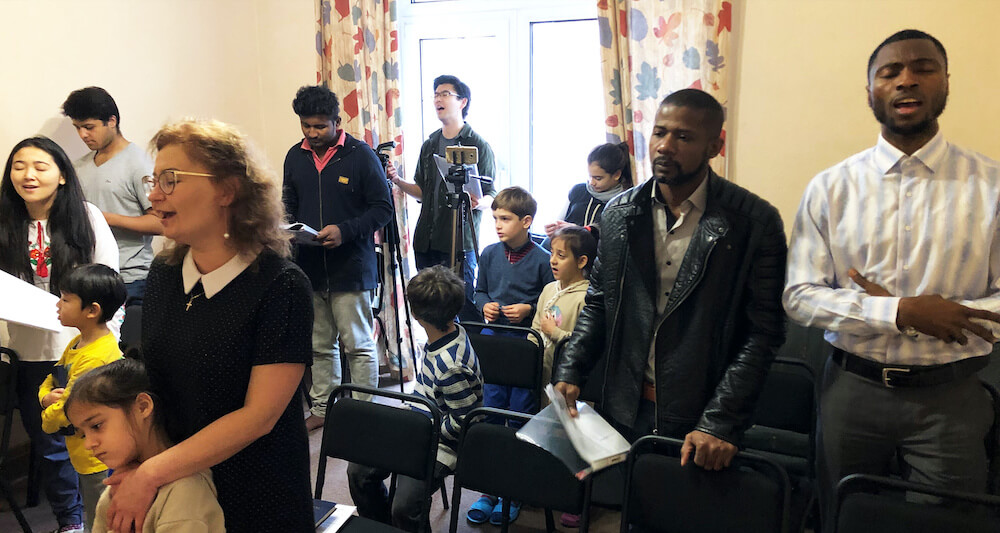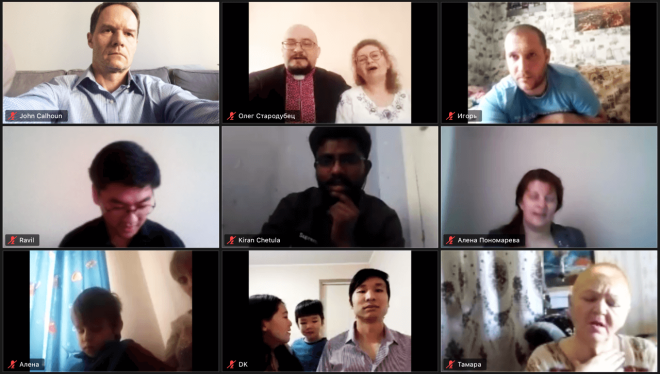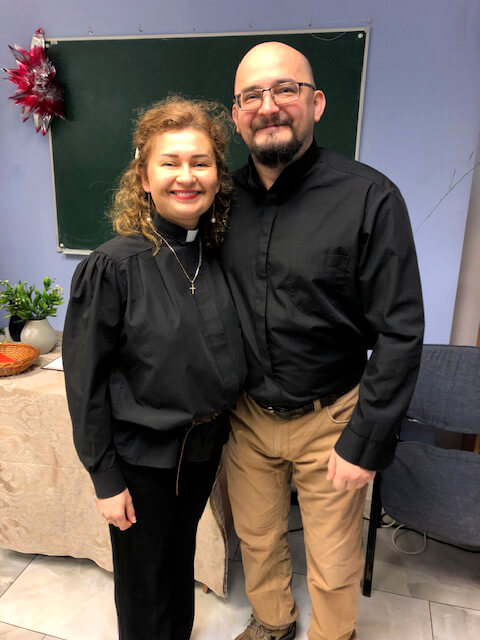
By John Calhoun
May 2020 |ATLANTA
In these days when the world is rightly focused on overcoming COVID-19, there is less attention given to the other crises in our world that, in ordinary times, leaders of good will and people of faith strive to resolve. The human-caused warming of our planet, conflicts between nations and peoples, the continued flight to safety by survivors of war and persecution – all these evils still exist and bring misery to countless millions, even as our world is distracted by more immediate concerns.
The ongoing armed conflict in eastern Ukraine, which this spring enters its sixth year, is one of those crises that goes largely unnoticed by the world, yet, continues to cause grievous injury. Soldiers with heavy and light weaponry fire nightly at one another; innocent civilians caught between the warring sides are killed, injured, or displaced at an alarming rate; political leaders in the region and around the world remain unable to resolve the dispute. Since the fighting began in February 2014, more than 13,000 soldiers and civilians have been killed, and over 1.5 million residents of eastern Ukraine have been driven from their homes.
United Methodists were among those affected of this conflict from the outset. During the first weeks of fighting in the eastern city of Luhansk, the local United Methodist church building was hit by shelling, damaging the sanctuary and forcing its members to flee for safety to other parts of Ukraine and into neighboring Russia. About two dozen church members were young men and women from Africa who were studying at a medical university in Luhansk. When their campus was overrun by pro-Russian separatist fighters, these young people – several of whom had sustained injuries – fled by makeshift taxis across the front lines, boarded buses heading west, and took refuge in Kyiv and other cities, where they were welcomed by local United Methodist congregations and provided with humanitarian and spiritual assistance.
Connected to the well-being of others
As the years have passed, the fighting has reduced in intensity, but the warring goes on and civilians continue to suffer. In a typical week, dozens are killed or injured, and many more are forced to flee their homes for safety. Over the years, some United Methodist congregations across Ukraine found themselves transformed through the integration of displaced persons into their communities. However, in time, as pastors and lay members continued to pray for peace and assist the needy, there arose a recognition that the conflict will go on, and there is no easy solution. As one pastor observed, the role of the church is to care for our flock, and we shall leave it up to the politicians to resolve the conflict.

PHOTO: JOHN CALHOUN
This particular perspective – let us look after our own and let go of the world’s problems beyond our doorstep – has been rendered moot by the current COVID-19 crisis. This global pandemic has reminded us that we are one, and that our well-being is inextricably linked to others. Indeed, the strict self-isolation and social distancing measures put in place here in Ukraine and around the world require each of us to sacrifice our own desires and interests for the welfare of others; to protect the ones we love, we must ensure the good health of strangers around us.
And although the adverse effects of the pandemic here in Ukraine have been significant, we recognize that the suffering of others is more extreme. To date, Ukraine has reported a relatively small number of cases – about 10,000 infections and 250 deaths. In contrast, in recent weeks COVID-19 has spread quickly across Russia, with the number of infected now nearing 100,000. Among many Ukrainians, even with the widespread hostility toward the Russian government for its aggression, there is genuine sympathy for the Russian people. In the face of this regional crisis, despite conflicting political views and patriotic allegiances, there is a newfound solidarity and sense of shared humanity.
God’s love is universal
The United Methodist Church in Ukraine is witnessing and professing the truth of our common humanity. In this season of Easter, as the global lockdown has closed houses of worship, UMC congregations across Ukraine are meeting online for worship, study and fellowship. Members of Kyiv UMC, an international community that conducts services and events in both Russian and English, gather around their computer screens each Sunday to sing hymns of praise, offer prayers of intercession and hear the word of God proclaimed. In recent weeks, Pastors Oleg and Yulia Starodubets have been preaching the truth of the Easter message: that God’s love extends to all persons, that Jesus Christ offers salvation to all and that we are all – regardless of citizenship or skin color or political view – members of the one body of Christ.

PHOTO: JOHN CALHOUN
And this message of God’s universal love for humankind carries deep meaning for the members and friends of Kyiv UMC. Before the outbreak of COVID-19, about two dozen church members would gather in person for a typical Sunday service. Now, each Sunday up to three times as many people log onto Zoom to participate in worship. And our expanded worshipping community is as varied and diverse as the body of Christ: university students from Sierra Leone and Tanzania, mission workers from Kazakhstan and the U.S., an English teacher from Nigeria, medical students in Kyrgyzstan, newly licensed doctors in India, friends across the border in Russia. All these sisters and brothers in Christ join our Ukrainian members in this new virtual community to worship God and proclaim the peace of Christ.
On its own, this act of communal worship – United Methodists in Ukraine, Russia, and across Eurasia, together praising the risen Christ – will not end the conflict in eastern Ukraine. But in our gathering, we claim our calling to be witnesses for peace. As we reach across national boundaries and political views to join hands in Christian fellowship, we demonstrate, as St. Paul wrote to the church in Corinth, the power of the cross to unify and heal. In this time of uncertainty, conflict and fear, we boldly proclaim to one another and to the world, “May the peace of the risen Christ be with you.”
The Rev. John Calhoun is a Global Ministries missionary serving as the multicultural ministries leader for the United Methodist Church in Kyiv, Ukraine.

